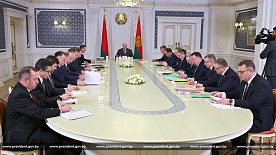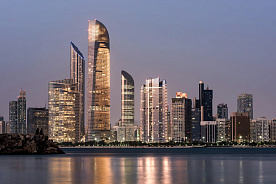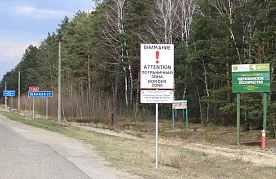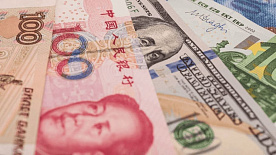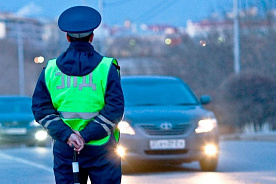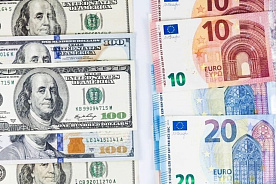Opportunities are nearby. They just need to be caught – Indian Ambassador in Belarus
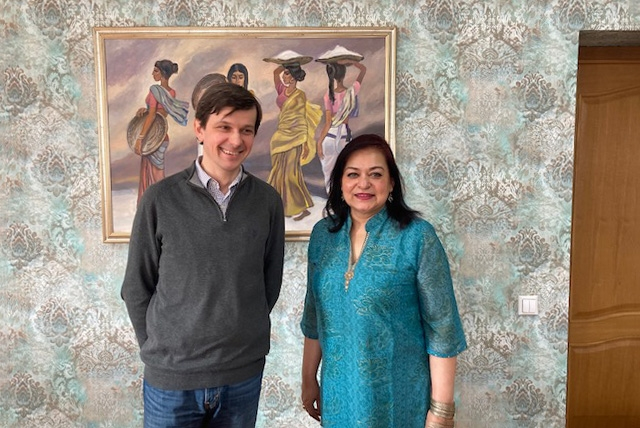 Ms. Sangeeta Bahadur and Zmicier Dryhaila. Photo: neg.by
Ms. Sangeeta Bahadur and Zmicier Dryhaila. Photo: neg.by
The second most populous country in the world, India. Over the past 10 years, so many joint projects have been discussed in the Belarusian media that they simply could not remain unnoticed in everyday life. But there is so little India in Belarus. Where are all these projects? Maybe we don't know something? Our questions are answered by the Ambassador Extraordinary and Plenipotentiary of India to Belarus, Ms. Sangeeta BAHADUR.
– Ms. Ambassador, let's first go over historical dates a little. In 2015, following the visit of President of India to Belarus, a decision was made to recognize Belarus as free market economy, as well as the allocate a credit line from the Eximbank of India in the amount of 100 million dollars. Foreign Ministry of Belarus website informs that for some reason the money has not been spent. What are these reasons? And how is this decision to recognize the country as a market economy made?
– Yes, we recognize Belarus as a market economy sinсe 2015 by several factors: as the right to private property, the right to transact business in a private environment without too much government interference and how the stock market of the country behaves. We follow the same list of criteria that are followed by countries around the world. Of course Belarus still has some elements of a controlled economy, but we felt that it's making enough progress, that allows give it the status of a market economy.
As for the line of credit of 100 million US dollars, it is still exist, but for whatever reason, it has not been possible to identify a suitable project. Which we have already agreed on and we thought that we will use that money for the development of the Orsha Bremina free economic zone. There was a lot of conversation, a lot of information that was exchanged. Some requests made by the Belarusian side to change the format of the loan, which also we agreed. Despite the fact that we have a standard set format for how these lines of credit are utilized. So, because of friendship between India and Belarus we really wanted to work with, we are ready to agree and try to change the factors that control a line of credit from us. But Belarussian must provide a list of requirements for the change to us in writing. But for some reason everything has just come to a standstill. We never did receive a response from the Belarusian side. I have personally, raised this issue very often with the Foreign Office, with the minister of industry and so on. We we've even been suggesting alternatives. For example, we could set up a multispecial hospital with that money or we could do some project in the hospitality industry. But somehow the Orsha project has been dropped, but nothing has been offered by the Belarusian side as a substitute.
– Next two questions addressed to specific plants, particularly Belaz trucks and Gomselmash factory. There was an official center for the maintenance of Belaz dump trucks was opened in 2016 in Nagpur. And possibly we were not mistaken. Last year, Belaz supplied 77 mining dump trucks to Coal India Limited, this year they were signed the new contract for the supply of 96 trucks. On the other hand, Gomselmash together with DVR Infratech Private Ltd. has created Joint venture in India in 2017. What do you know about it? Are Belarusian harvesters assembled in India, or are there deliveries of ready-made machines to India?
– We're very happy with the agreement between India and Belaz, because it has been a sore point in our relationship for many years. Somebody thought that we were not giving a fair chance to Belaz dump trucks because we have been buying other vehicles over all these years. Mostly we've been buying from the American company Caterpillar because, they met all the specifications. But we were repeatedly told that Belaz has the same quality of products. In fact, I personally pushed a lot for, promoting these trucks. Of course, I was just a small factor, but whatever I could do, I did. And finally, we discovered that an agreement is being signed. And you've you know the numbers already. Initially, we purchased 77 dump trucks and now are another 96 mining dump trucks. Which have already probably left or at least one batch of them has already done. So I'm quite convinced that this cooperation between Belaz and Coal India will go further. Also, there might be a good deal signed between these two companies. And this is a very big transaction running into hundreds of millions of dollars. So it has been very profitable for Belarus. It has also, pulled the trade to the next level all together. So this is something that we are very happy about.
As for the Gomselmash deal, whatever we understand, nothing much seems to have happened on that so far. I think Gomselmash had sent two sample vehicles, tractors to India. And then there was a lot of issue about the amount of customs duties that were imposed. So I don't think that so far the joint venture has fructified it is, except for those two harvesters that were sent. I don't think there is there's been any mutual investment or any creation of a joint venture, where these trucks are being produced. But we are still hoping that something will happen in future.
– Now let me close this part of questions with the question addressed to Technology Demonstration Centre in Hyderabad was planned to open in 2019. Is it open and working?
I think they are handling some a lot of joint, I will call them projects, but no ideas of how to collaborate more on the technological front. They are very specific ideas that are being examined and people are working on, on developing something useful, something which is can be used in both the countries in many ways. So, I don't know the details, but I know that the center is functioning and it's functioning very well.
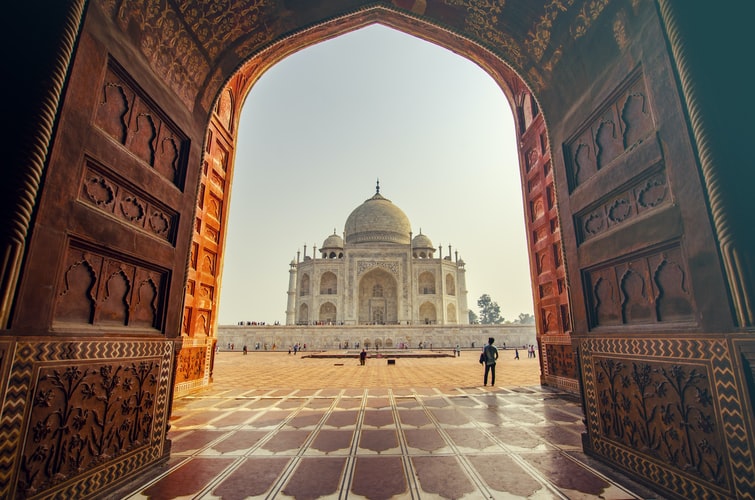 – Ok, the next question is connected with the visas. Since 2017, the cost of a single-entry visa has increased for Belarusian citizens from $40 to $100. In 2019, it became possible to apply for an electronic visa for 30 days. The cost of a 30-day visa is $ 25 from July to March and $ 10 from April to June. The cost of an annual e-visa is $40. How did the opportunity to open an e-visa affect the flow of tourists from Belarus to India, before the start of the pandemic of course?
– Ok, the next question is connected with the visas. Since 2017, the cost of a single-entry visa has increased for Belarusian citizens from $40 to $100. In 2019, it became possible to apply for an electronic visa for 30 days. The cost of a 30-day visa is $ 25 from July to March and $ 10 from April to June. The cost of an annual e-visa is $40. How did the opportunity to open an e-visa affect the flow of tourists from Belarus to India, before the start of the pandemic of course?
I think that is the operative factor because we started the electronic visa services, in the middle of 2019. So until the time as the pandemic hit, it had a very good impact. I cannot give you figures because the electronic visas are applied for directly online and the figures all go to the authority in India. We know that a lot of electronic visas were taken, because of cost. Twenty five dollars, this is quite drop. Then from March we closed down the country. We had a major lockdown. Nobody was allowed to entry. Even today, we are not issuing tourist visas. Online visas are suspended for all countries, not just for business. So as a result of that, the impact was felt only in the first six to eight months of the introduction of the visa system. Now we are hoping that when we open the country for tourists and we start issuing visas again, we will see the surge again. Because, obviously people are tired of being in the same country and they want to travel. But we are hoping that soon it becomes possible for people to travel and the airline restrictions are removed. Also when the electronic visa system is restored again, it will have a very positive impact on the tourist traffic between countries.
– The pandemic has become a real challenge for the whole world. India currently ranks third in the world after the United States and Brazil in terms of the number of diagnosed covid-19 diseases (almost 12 million people, this is more people than lives in Belarus). The number of tests done in India (240 million) is also second only to the United States. What are the restrictions on the daily life of people in India? What is the practice of diagnosing coronavirus and providing treatment with the existing social stratification and caste structure of Indian society?
– Because of the huge total population of India the number of infected people by covid is large. But comparatively, it's a much smaller percentage of the population than in many other countries. But because the numbers are so big, with one point three billion people, even if it's just 10 percent of the population that is a very big number. It has been. It could have been much worse, because all the WHO and others were predicting that India will be the disaster case. But it didn't happen because we managed to control it very well. One of the reasons was the draconian lockdown that we imposed where all our cities were like ghost towns. Nobody was allowed to step out or meet or whatever. It was a very tough time. But for six months we had that. So I think, very definitely controlled the pandemic. And we use that time to increase the number of hospitals, the number of care centers where patients could be admitted tested, the number of testing. In the beginning, we didn't understand that we were not even producing enough equipment, like gloves and costumes that are supposed to wear the doctors and nurses. But by the end of the six months we were producing enough, not just for assets, we were also exporting. So that period was used very constructively. Now, the situation is had really flattened completely.
And we were very happy that the situation seems to be completely under control. But in the last one month, people relaxed, they thought it was gone and finished. End everyone started behaving exactly the way they used to before the pandemic. So now, especially in the high density cities like Mumbai, Delhi, Chennai and in parts of Punjab, all these places have a second wave, just like Europe is experiencing. So the numbers are going up again. There are talks of imposing lockdowns once again, on the very badly impacted regions. I think, in some of these places have imposed a night curfew by now. The number of people being tested every day has gone up tremendously. People are talking in terms of a second lockdown, but as of now, I don't think the government has taken any decision about a nationwide lockdown. Now they're managing with locking down areas, may be cities, may be some parts of a particular state. But that is how we are managing it as of now.
– Last year, a second runway was opened at the Minsk National Airport, and it can accept aircraft of all types. Are there negotiations between our countries on the opening of regular flights? In April 2020, in particular, Belavia Airlines flew to Goa in order to pick up our citizens stranded in India during a pandemic. It would be possible, at least, to open direct flights between the twin cities, Minsk and Bangalore.
– Just before the pandemic hit, we had started actually discussing a proposal for the introduction of direct flights not between Bangalore and Minsk, but between Minsk and Delhi. It had reached a stage where the two civil aviation ministries were already speaking about, that there wouldn't be a direct flight. This has from Minsk to Delhi via Dushanbe that was supposed to be the flight path and everything was under discussion preparation. The Minsk Airport Authority had taken the lead role in that and they were doing very well. But then the pandemic came and all sides stopped. I feel that with so much interest now and the passenger traffic between the two countries, according to the Minsk Airport Authority, it had increased to a level where, direct flights like this, could be justified. So once the pandemic situation is under control and tourism picks up speed again, this whole issue will be taken up once more. But what you mentioned about the Minsk and Bangalore traffic direct flights, a very good idea because we want to invigorate the sister city relationship.
I recently had a meeting with the mayor of Minsk and we discussed this, the specter of the Twin Cities and how we can enhance IT capitals. It is now really high time to start exploring business opportunities between the two and in order to promote business activities airlines. Airline connections between two cities becomes important, because it is much more easier for people. Because now to get to Bangalore it is a very complicated process. If we have a direct flight between Bangalore and Minsk, that could be the second step, because right now we are discussing between Minsk and Delhi. So when that starts, we can perhaps think about another flight, maybe once a week. Definitely that's a very much on the agenda.
– On March 4-5, 2020, even before the coronavirus pandemic was announced, the first Belarusian-Indian investment forum was held in New Delhi, in which 9 Belarusian and more than 70 Indian companies participated, as well as a meeting of the intergovernmental commission on cooperation in various fields, within the framework of which a protocol was signed on the exchange of instruments of ratification of the Investment Agreement. What is this protocol? Is it about the fact that investments in Belarus will go faster? What is the size of Indian investments in Belarus in 2019 and 2020? How much of them are direct investments?
– About the signing of the protocol. Definitely protocol was signed for the exchange of ratifications of this investment agreement But it was more than nature of General protocol appreciating that this agreement has been reached between the two countries. Also notes the potential to increase and to develop Mutual Investments between the two countries. I don't think anything very specific has been mentioned in that protocol, about in which areas the investments will happen or how much investments will take place at.
This is more of a general agreement that investment opportunities should be explored between the two countries. We had launched for India this concept, where companies from all over the world are being given special opportunities to come and invest. To become a part of the Indian economy. India has succeeded as well, there's one of the very few major economies in the world, which has made such a rapid turnaround from all the economic issues that resulted from the pandemic. Just like in Belarus in fact was luckier, but in many other countries all economies came to a standstill completely. So as I said, for six months, people couldn't even step out of their homes, the GDP whether that had dropped. And now it is rising again. Industries are becoming operational. So it's this whole making India program has had a very positive impact on the Indian economy. And I believe Belarus has the same kind of program that they are being promoted. The idea is to identify specific things in which Mutual Investments we can take place. We've been discussing this issues not just with the government but also with Bel CCI, and we've been suggesting from our side the areas in which such Investments could prove, to be mutually beneficial. Because in Belarus, it is much better to get into a partnership with a local company and to do at least some part of the production, even if it's just packaging should be done here. Then it becomes easier for us to enter the market in India. So, you can do much more than just packaging. And a lot of Belarusian companies are taking advantage of that, especially in the agricultural sector, in various missionaries, in the petroleum industry and so on. So there are many areas in which Belarusian companies are finding opportunities in India.
I think apart from a couple of pharmaceutical Ventures, like Nativita. Also, there's another one's here, but mostly whatever investment has been come the pharmaceutical industry and has really been very much quite frankly. One of the issues is that Indian businessmen from whatever feedback I get. They find it difficult to negotiate the market because they're not very clear the rules and regulations. They are not very sure about. Sometimes unfortunately, some business negotiation may come up to a certain point and then suddenly, it doesn't work out. So they are a little wary of stepping into the Belarus in Market.
As we mentioned in the beginning it is still controlled. So they're not very sure how safe the Investments would be, how far they can go with the Investments. These are some issues that they are not very comfortable with. I think your Embassy in Delhi, should be like promoting Belarus, as an investment destination to Indian business people. Indian money is going out to all over, we are the biggest investor for example in the UK. I mean the amount of investment we have done in America, in various other countries. So why not Belarus? It is just that Belarus has be promoted in the right way. The legal and rules position should be made very clear and this fear that business people have that, rules and regulations can be suddenly changed, the legal situation can be suddenly changed. That is what is preventing people from coming. So once they are sure about that once you given a commitment, this is how it would look.
– It was planned to open a joint venture for the production of drugs "Jiva Pharm" in Kaliadzichy. Construction was to be completed by the end of 2018. Does the enterprise work?
– It all started in a very nicely and I went for their inauguration of the plant. Two sides were very enthusiastic, but we get some stuck. Now they're producing medicine here. So they were expecting government orders for a certain amount of medicines. We need to do some that plant. Unfortunately for whatever reason, the order was given to a rival company, which had nothing to do with Dzhiva Farm. One of the terms of the contract was that the Belarusian government authorities would be placing orders for a certain amount of medicines from this production facility every year. If that is not been being honored then they felt that there was no point. So I think that is when they withdrew and I am not very sure what they're doing. But I think this particular joint venture is now not in operation. So this was the reason, from my understanding.
– On the other hand there is a variety of some positive examples of our collaboration. I mean EPAM office which was opened in India in Hyderabad in 2018. And more than hundred programmers, maybe even more working there. What's maybe another concrete interesting examples of our positive collaboration and maybe do you know of something from their feedback from the India?
– Unfortunately, no, private companies don't keep us informed of all the things that they're doing. I'm aware that a lot of business interaction has been going on between the two sides particularly in some Innovative Fields apart from IT. You know the producers of electric buses here in Belarus. They have been to India. They have set up and also provided prototype buses to several cities in Punjab, in West Bengal and Calcutta. And they are hoping that they are going to get business from this.
In the field of petroleum, we have the Belarusneft, which is present in India in a big way now. They are working on several projects for reviving old oil wells which had tapped out. I think that Belarusneft has this technology where they can dig deeper.
Earlier this month, there was very big Expo of food and agriculture products. And a large team of Belarusian business people have gone there to attend that Expo. I'm sure lot of business will come out of that. In many ways it is far more than what is reflected in our trade figures, because a lot of this economic exchange happens via third countries, like Russia, Poland, Ukraine.
There are a lot other areas we can explore for developing interaction. So we as an embassy, we are currently focusing very heavily on more agricultural products from India, dairy products from Belarus, then things like garments textiles, fashion, like a lot of from my personal experience, can work on both sides. I keep suggesting to BelCCI, to the ministry of trade. So a lot of ideas are currently floating around, even 25% or 30% of that starts working, the trade between us can really grow up. I just wanted to mention that Belarus trade in this region is actually on a very high level in most other countries, like Ukraine and Poland, or any of your other neighboring countries.
So that way we are already doing not too badly, considering the discrepancy inside. Indian business people know the economic situation in Belarus, the rules and regulations that we are talking about one of the issues is. Also that it's a small market, because Indians are used to thinking in hundreds of millions. The total population is only nine and a half million that which is half of New Delhi alone. So for them it is difficult to sort of convince themselves that there's enough business potential here, but despite that we are already doing a business of nearly 600 million dollars a year.
– India is one of the leading industrial manufacturing countries in the world. At the same time, medicines and seafood are the main commodity items of India's export to Belarus. Also rice, parts and accessories for cars and tractors, peanuts, coffee and tea concentrates. Why, firstly, not coffee and tea itself, but its concentrates and essences, extracts? And secondly, what do you think is lacking in this list, what Indian goods could be in demand from us? And separately - where are your fruits on our shelves? Or do you eat it all yourself?
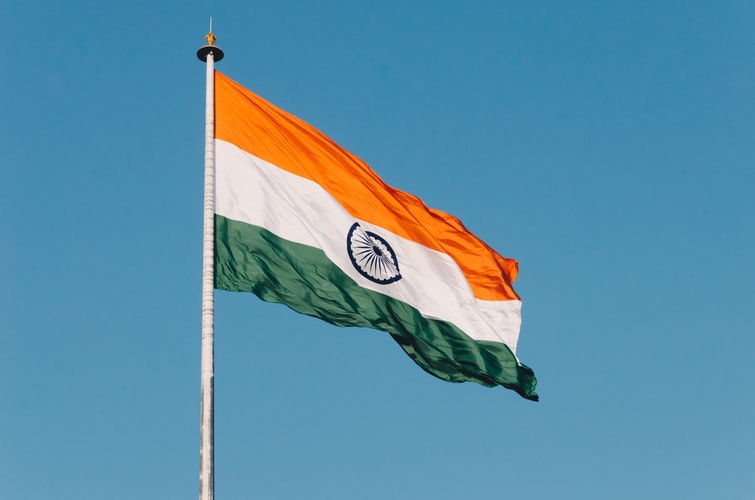 – It's probably because the right people are not getting in touch with each other. There's no any kind of legal restraint put on Imports of these Commodities from India. The older generation told me how for them tea (chay), was meant Indian tea. But now when you look around the market seems to have been taken over by Sri Lanka and you know coffee comes from South Africa. Although Indian coffee is also very well received in all over the world. So there is a problem of the right business interests not coming together for these things. Fruits again we been trying push with BelCCI. You know India has such a huge variety of fruits, particularly mangoes. You import them all the way from Brazil, from South Africa, from Peru, however there's nothing like Indian mangoes in the world. So why not from India? Things like guavas, like lychee, like so many exotic fruits. So my feeling is just that, the right people are not coming together. Now we are beginning to focus on that, hopefully this is will also start happening. Whatever you see on the list of exports and imports, that is one thing. But every time I visit trade expo here, here in Belarus, I find that there are indeed companies who are participating in various things like medical equipment, pharmaceuticals, machinery, car parts, all kinds of things. And you sort of use it. But are you actually exporting to Belarus? You see how it is not reflected in the trade figures. Then it turns out that it all happens through third countries.
– It's probably because the right people are not getting in touch with each other. There's no any kind of legal restraint put on Imports of these Commodities from India. The older generation told me how for them tea (chay), was meant Indian tea. But now when you look around the market seems to have been taken over by Sri Lanka and you know coffee comes from South Africa. Although Indian coffee is also very well received in all over the world. So there is a problem of the right business interests not coming together for these things. Fruits again we been trying push with BelCCI. You know India has such a huge variety of fruits, particularly mangoes. You import them all the way from Brazil, from South Africa, from Peru, however there's nothing like Indian mangoes in the world. So why not from India? Things like guavas, like lychee, like so many exotic fruits. So my feeling is just that, the right people are not coming together. Now we are beginning to focus on that, hopefully this is will also start happening. Whatever you see on the list of exports and imports, that is one thing. But every time I visit trade expo here, here in Belarus, I find that there are indeed companies who are participating in various things like medical equipment, pharmaceuticals, machinery, car parts, all kinds of things. And you sort of use it. But are you actually exporting to Belarus? You see how it is not reflected in the trade figures. Then it turns out that it all happens through third countries.
So they export to Russia, and Russia re-exports. So, if we have a direct trading relationship between our two countries, our trade figures would also go up. The costs would come down. You don't have to be middlemen. So I don't know why this is not happening. So obviously, there's some problem, the right people not getting together. Maybe there's some regulation issues as well. But this is something that BelCCI, two governments, and the Indian organizations of Chambers of Commerce, et cetera, have to come together and find it as it is. BelCCI, of course, is a monolithic body in Belarus, but you have different chapters in different cities and different provinces. We've been trying to get them together with their equivalent organizations, trading and commerce organizations in India. Recently held several online meetings between the two sides and we've noticed that there is a lot of enthusiasm. People are very keen to get started. The only thing is now to find is start focusing on specific things rather than making a very general kind. So that's when we discovered that, these things like agricultural products, fruits, vegetables. Then we thought from Belarus, your textile and fabric. That is a marvelous material for the Indian climate. Similarly, garments from India could come here, silk's, things like that. So we've identified four or five products on which we are laying emphasis. Once that takes off, then perhaps we can look at.
– At a meeting of the intergovernmental Belarusian-Indian commission on cooperation in the field of science and technology in August last year, agreements were reached on holding the next competition of Belarusian-Indian scientific and technical projects in May 2021. What is this competition?
– I tell you very frankly, only I know that the meeting took place. Unfortunately, we do not have an officer here who is dealing with science and technology cooperation between the two countries. Our science and technology officer in Moscow, he's taking care of things here. So he was the one who had this meeting online again and I do know that he was very happy with that. He said that we have come up with some very innovative ideas. So maybe this contest is one of them.
– In 2020, Belarus exported 78 million tons of potash fertilizers, India is the third largest importer of these products, totaling $ 290 million in 2020. What volume has been contracted for this year?
– This was the last contract signed. As far as I'm aware. We haven't signed one this year. So this is probably valid for several years. Usually for five years. I think it will probably be around the same amount and the contract will remain valid for the next several years. The volume will probably continue to be the same. We don't sign a contract every year.
– The next two questions might be skipped. India has the second largest population in the world. The entire region of Southeast Asia is overpopulated and there are territorial conflicts between countries. What is India's situation along this line with Bangladesh, Pakistan and China? How does India resolve disputed territorial issues?
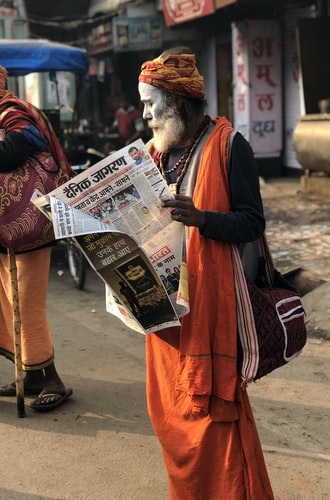 – I certainly don't want to skip this question because this gives me an opportunity to sort of speak about an issue, which is not really very common to hear in Belarus. It might be interesting for your readers. We have a history of territorial disputes with all these neighbors that you mentioned, whether it's Pakistan or China or Bangladesh.
– I certainly don't want to skip this question because this gives me an opportunity to sort of speak about an issue, which is not really very common to hear in Belarus. It might be interesting for your readers. We have a history of territorial disputes with all these neighbors that you mentioned, whether it's Pakistan or China or Bangladesh.
We have had a very successful resolution of issues with Bangladesh because they were willing to talk. We had the problems, the difficulties. Where the line passes by, we had enclaves on both sides, Indian enclaves on the other side of the border, Bangladesh. And so this was all because of the manner in which the partition of India happened. It was done in a hurry. The British officer who had come, Radcliffe, he basically just said “I don't know whether it is 100 percent correct”. But he got so confused that at one stage he simply sat there with a red pencil and he drew a line wherever he wanted. So as a result, a lot of problems came up because the line might go through somebody's house. All these issues were there. But because we have in the last few years, a very cordial relationship with Bangladesh and they were willing to sit down and talk to us. All issues have been resolved.
This is nothing pending anymore with Pakistan. It's an ancient history. Again, from the days of the partition in 1947 when the Maharaja of Kashmir ceded to India and he said he wanted to join the Indian Union. At that time, Pakistan sent its regular army and they tried to take Kashmir by force. He called the Indian army and we stopped them. So because of that, Kashmir has become a disputed territory in their eyes. For us, we have always been very clear that all of Kashmir is ours, that you have no right on it and your side of Kashmir, you are just an illegal occupation of that. We have always been very clear in the UN forums, with Pakistan resolving the territorial dispute seems to be something that might take maybe a couple of hundred years because of the political fallout of any decision taken by any government. And also the fact that Pakistan is totally not willing to sit down and negotiate in any way. I don't blame them in the sense that for them, the reason of their existence, to a large extent, is claiming that Kashmir is a part of their territories. And now if they at any point say, OK, take it, what will they say to their people? Right. So I don't think they are going to back out in any way. Our position has always been very clear. So we are not going to concede that the border of Pakistan and of Kashmir that they occupied is this just it's a line of control.
Dispute with China is now a very different story again. China, has these historical claims on territories all over the world. So recently they also said that certain parts of Russia actually belong to China. They have based on that theory, they have taken over in Mongolia. They've taken over various other regions of the world, Tibet and Taiwan. So and so they have been trying this tactic with India, the most recent example was last year when they invaded, the Indian side of the actual control line, as they say. This is something they've done way back in 1962, at that time they had managed to take away some of that territory, but this time they were not prepared for the kind of response that they got from India. So ultimately after about five months, they were said “OK, sorry, they won”. So now we're back to, things were before August Twenty. Again, with China, it is very difficult because they see themselves as they call themselves the Central Empire. They have this whole theory of how they are entitled to a lot of territory around the world, particularly in Asia, and they have their own world view of how. So they've always been very aggressive about this. And that is the reason why a lot of countries in the region are very scared of Chinese encroachment on them, it's really dangerous here. So, again, as far as territorial dispute resolution with China is concerned, I'm not very hopeful of anything being done because it would Pakistan, for example, we have made it very clear, our prime minister has been telling them repeatedly that you cannot have talks along with terrorism, so long as you keep sending terrorists into Indian territory. We cannot have talks with you. What is there to talk about? If you're coming and killing people. Once you stop terrorism, then we can talk about border issues with China. Again, if there is aggression, how can there be talks, although there are army level talks happening because of this withdrawal, 72 days, but probably for the first time, China has come across an opponent where they have been met with very serious resistance and they have not been able to encroach into our directorate. China is also aware that India is too big, so it's not like they can just walk in and take over the country, there's no way so they can try and take small mouthfuls from here. From there they have these areas.
They have one third of Kashmir with them because Pakistan gift and they have some territory that they managed to take over in the northeast of India in 1962 when they invaded us. This is our territory. You took it over. We have to give it back. And they say now we've taken it, it's ours. So with both these countries, the issue is very complicated. I do not think there is an easy resolution. Both sides would need to probably take a very adult view, stop behaving like you just beating monkeys, actually sit down and talk. Unless Pakistan and China are ready to do that, I don't see how we are going to resolve this. So we have never tried to take over territory from any neighbor. We are not coming into your country, so don't do it. But I think they've all these countries have their own political domestic agendas, which they are following. So I do not see a resolution coming very soon.
– Indian farmers' associations and unions, which have been organizing protests against new agricultural laws for two months now, announced a rally on February 6 to block major highways. Can you briefly explain what the farmers are opposed to
– So two points that I would like to make. One is that the farmers themselves do not seem to be clear about what they want changed in those laws. The laws themselves, from everybody else's point of view, are very logical, very reasonable and very beneficial to the farmers. Essentially, what these laws mean after these laws were enacted in India, the system was that a farmer could sell his agricultural products, only in the agricultural market closest to his farm. So if there's a market, which is Mundy's in India, the agricultural markets, so it is 20 kilometers away, that is the nearest one. That's the only place where you can go and sell your products. What these laws have done is to expand that. If you want a better price in another Mundy, you go there.
So it is like, for example, if you could only take a bus, from Minsk to Vitebsk. And suddenly the government says, OK, now we're adding a railway line. We also adding a road which goes there. We are also adding a flight, so you can do whatever if you want to use the same bus route you do that you want, to go by highway by car. If you want to go on a train, you can do that. You want fly, you can do that. So rather than appreciating the fact that so many other options are being given, these farmers for some reason are saying, no, we want to go back to the same system.
So the problem seems to be that the farmers who are protesting are not really farmers. These are the brokers, who are controlling these money. So for them, it's a big loss of business. That is why the protest is limited to only two or three states. The rest of India is very happy. All farmers are very happy. But the farmers in Punjab are not the farmers, but the brokers in Punjab. They're calling themselves farmers unions, but they actually brokers in Punjab, in parts of Rajasthan and small parts of a couple of neighboring states. They are the only ones who are protesting. They're not saying what they don't like about this. They just say repeal the laws.
The government is saying, tell us what you object about and we'll change that because we don't understand what you want. And on top of that, we have been discovering in the last few months a lot of anti-India elements, there's this movement called - Khalistan movement. It was very strong in the nineteen eighties where the some Sikhs were trying to agitate for a separate homeland. Now all of them live in Canada. They're sending a lot of money from there to keep these protesting brokers. There's a lot of international money from terrorism, from drugs, from mafia and so on, supporting these people, it's very evident. You can see it on the ground, the kind of money which is being invested into this. A lot of people have been fed Hollywood stars and who knows what else. It's all come out now, but they've been paid millions of dollars to make pro agitation statements.
All these facts are coming out. So less and less people in India believe that these families have actually any grievance. They're unable to tell what the problem is. They're just sitting there. It's become a very confused kind of situation where the government is not taking any serious action because they don't want to hurt their own people. Many people of them have gone back home. It's been five months now. So any real farmer, will not be able to sit out there for six months. And what about your farms? What about the crops that you're growing? So the fact that these people are sitting there is also indicative of their not really being farmers. They're more like brokers. So they brought some old farmers, all women, children who were all sitting on the sides of highways. And many of them are now constructing proper houses in the middle of the highways, saying that we just want to live here.
Why are you doing that? Because it's so hot now. We want air conditioners to be installed in a tent. So it's all become totally ridiculous. Now less and less attention is now being paid. They're just sitting there and waiting for. But the government has made it very clear, the laws are not going to be withdrawn. That is the situation right now. And in fact, Delhi is the one city that has suffered the most because people have a job very close to Delhi. A lot of people who come to work in Delhi, they travel every day. It's a long distance, it so difficult to get through because of these people sitting there and agitating so much. The government doesn't know what to do because these people are unable to explain what they want. So it will drag on for the next few months.
– Let me return to our relationships. Which Indian restaurants in Minsk do you prefer? Can you recommend a Belarusian restaurant at homeland to some of the guests of India?
– As far as the places here are concerned, I think the only one is normal is Om Nama. Earlier they used to be something called the Taj. Then there was one more. Many years ago I'm told they're all closed down for whatever reason. Gan Bei is an Eastern cuisine restaurant, so they also serve Indian food. Food is very good, but it's not an Indian restaurant. Then there are new small restaurants that has come up and the Belarusian Medical Universities in Minsk and Gomel. So these are the only options that you have in Minsk, apart, of course, from the restaurants of the Indian Ambassador(smiling). If you want really authentic food, that's where you get it.
As for Belarussian it isn’t any restaurants in India, I'm not really aware of any example. There are definitely Russian restaurants. There is also a Ukrainian restaurant. But I never heard for Belarusian restaurant and yeah, that's good business. Place is free. And for example, Draniki is so similar to what we call Alyutiki, just less spicy. I think the beef is something that most people would not eat, at least in the north. But fish or chicken, things like that, they're cooked in the traditional sense. We would be very interesting because it's a cuisine that Indians are not familiar with, quite frankly. So when I came here, all these things I tried for the first time that I'd never had before. So, you should, spread the word. Anybody wants to go and set up a restaurant in India, will be very successful. And restaurant business is one thing that never goes out of business in India. So many people who want to go out and eat.
– And the last question will be little bit surprisingly changed from the general issues that our paper interesting. India is a very special country. This is a place for spiritual development, spiritual practices, yoga, a unique musical and ethical concept - raga. How is religion in India related to the economy (if it really connected any way)?
 – It's very interesting trying to relate the Indian spiritual and cultural concepts to business, but I do know that a lot of management lectures are given these days based on how the public, for example, can be useful for business concepts and many other spiritual factors that go into encouraging the economic situation in India and also in other countries. So once I came across many years ago, this very interesting concept of the difference between the Chinese dragon and the Indian elephant. So the idea was that the dragon is very aggressive, goes and grabs, and takes what it wants. And therefore, in the short term, it seems that it is winning. But the elephant is huge. It's efficient, it is gentle, mostly unless provoked. And that is how it makes progress.
– It's very interesting trying to relate the Indian spiritual and cultural concepts to business, but I do know that a lot of management lectures are given these days based on how the public, for example, can be useful for business concepts and many other spiritual factors that go into encouraging the economic situation in India and also in other countries. So once I came across many years ago, this very interesting concept of the difference between the Chinese dragon and the Indian elephant. So the idea was that the dragon is very aggressive, goes and grabs, and takes what it wants. And therefore, in the short term, it seems that it is winning. But the elephant is huge. It's efficient, it is gentle, mostly unless provoked. And that is how it makes progress.
So I think this has been very true of, for example, the Chinese volunteer hours. They progress very fast, much faster than we did. But then, they reached a kind of high point and now probably are falling down. Our progress has been slower, but it has been more, towards the upward side. And it hasn't stopped in that sense. It might slow down. Then it takes up again.
We have Hinduism, which is a prevalent religion of India. We don't call it a religion at all. We say it's a way of life. And we also, call it the sonata, which is something that has existed forever. Sonata means forever. So and so for us, it is no longer in life, because if you can't achieve the COAG for next year or 10 years later, it's all the same. So that feeling of impatience is not there. That feeling of trying to grab things, rapaciousness, that is not there. So in the long run, that is how Indian business also operates, because you bide your time, you see if you can't achieve something straightaway, you'll wait for a few years, see how it goes.
Decision making is slow comparatively, because, one, the country is a democracy. Everybody has to agree on a lot of chaos. Different people want different things. The business people think in a different way. Government will think in a different way. Ordinary people think of it differently. But ultimately, somehow it all comes together and you keep moving forward.
And the second thing that has probably impacted the economic environment in India and in the way we do business with the rest of the world, is also the basic respect that we have fought for the earth. We consider to be a living entity because we think of it as a mother. All of us do. But for Hindus, it is very much a concept in that sense that we have a name for it and we call it mother. So how to avoid doing damage to your environment, to other life forms? Because we do not believe that human beings are the only people who count. It's animals or trees or insects or birds or whatever. So you have to show that kind of kindness. And because of that, probably despite the fact that it's such a huge market - 1,3 billion people working there, living there, the environmental depredation has been far lower than in a lot of other countries. So to me, China, where have really damaged their environment. We have probably managed to avoid these long term bad effects of development, perhaps to some extent because of spiritual concepts and what we believe in and of the religion. The one religion that really does believe in the concept of non-violence towards everyone, not just of the other human beings or other countries, but other life forms. And this sense that we have, because not only in this life, we believe in reincarnation. That sense of hurry, and we have to do it right now, and if you're not doing right now, then we are not. We are doing something wrong that is not there. So you can afford to relax and think big, think on a long term basis. And ultimately, everyone arrives at that point. That is what we believe. So I think the Indian business also functions to a large extent on this basis.

